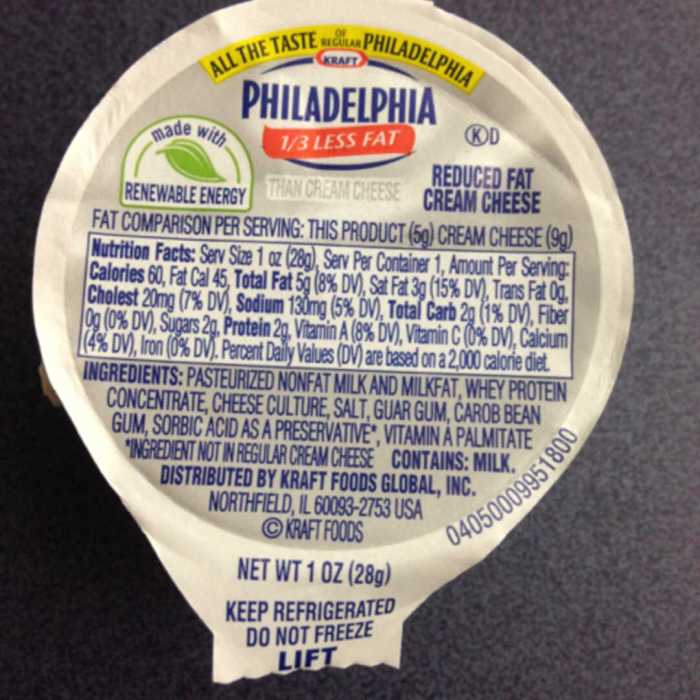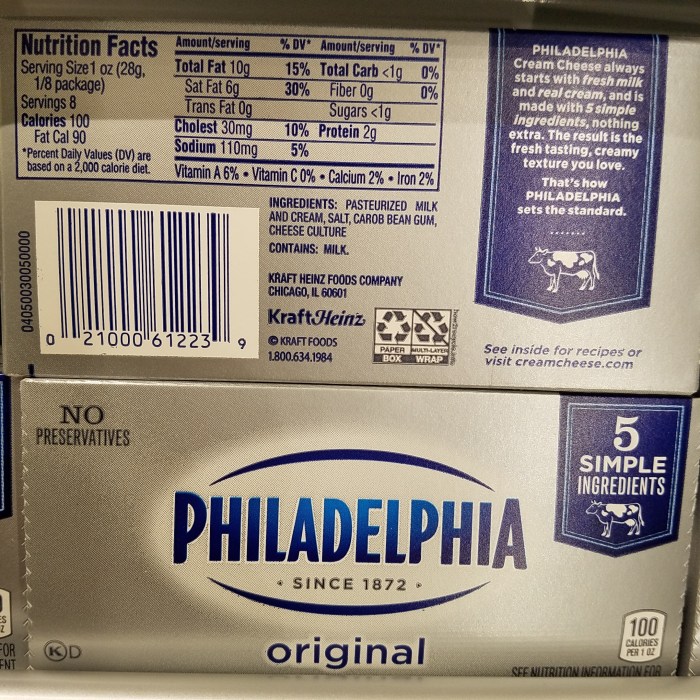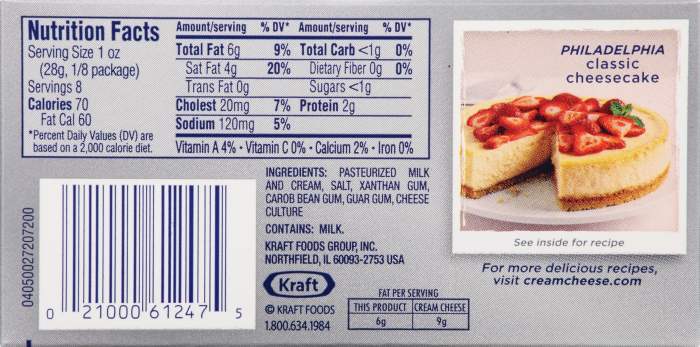Comparison with Other Cream Cheese Brands

Philadelphia cream cheese nutrition facts – Choosing a cream cheese brand often involves considering nutritional factors beyond just taste and texture. Understanding the variations in fat, sodium, and carbohydrate content across different brands allows consumers to make informed choices aligned with their individual dietary needs and preferences. This comparison focuses on Philadelphia cream cheese and two other popular brands to highlight these key nutritional differences.
Nutritional Comparison of Cream Cheese Brands
The following table compares the nutritional information per serving (approximately 30g) of Philadelphia cream cheese with two other widely available brands, assuming standard varieties (e.g., regular, not reduced-fat options). Note that slight variations may exist depending on the specific product and packaging size. Always refer to the nutrition label on the individual product for the most accurate information.
| Nutrient | Philadelphia Cream Cheese | Brand B Cream Cheese | Brand C Cream Cheese |
|---|---|---|---|
| Calories | 90-100 | 90-100 | 90-100 |
| Total Fat (g) | 8-10 | 7-9 | 8-10 |
| Saturated Fat (g) | 5-6 | 4-5 | 5-6 |
| Sodium (mg) | 100-130 | 110-140 | 90-120 |
| Carbohydrate (g) | 1-2 | 1-2 | 1-2 |
Implications for Consumers with Specific Dietary Needs
Variations in fat, sodium, and carbohydrate content across cream cheese brands have significant implications for individuals following specific diets.
- Low-Fat Diets: Consumers on low-fat diets may prefer brands with lower total fat and saturated fat content. While the differences between the brands listed may seem minimal, these small reductions can accumulate over time and contribute to overall dietary goals. For example, consistently choosing a brand with 1 gram less of fat per serving could lead to a significant reduction in fat intake over several weeks or months.
- Low-Sodium Diets: Individuals managing blood pressure or following a low-sodium diet should carefully consider sodium content. Even small differences in sodium levels between brands can be important for those needing to strictly limit sodium intake. For instance, choosing Brand C consistently could reduce daily sodium intake compared to Brand B.
- Carbohydrate-Conscious Diets: While carbohydrate content in cream cheese is generally low, individuals monitoring carbohydrate intake should still be aware of minor differences between brands. These differences are generally negligible for most diets but may be a factor for those on very strict carbohydrate-restricted diets.
Ingredients and their Nutritional Impact

Philadelphia cream cheese, like many dairy products, derives its nutritional profile from a relatively small number of key ingredients. Understanding these ingredients and their individual contributions is crucial to appreciating the overall nutritional value, and potential drawbacks, of this popular spread. The interplay between these components dictates the cream cheese’s fat content, protein levels, and overall caloric density.The primary ingredients significantly influence the nutritional profile of Philadelphia cream cheese.
These ingredients work together to create the creamy texture and characteristic flavor, but their individual impacts on nutritional content vary considerably.
Primary Ingredients and their Nutritional Roles
Philadelphia cream cheese typically lists cream, milk, and cheese culture as its main ingredients. Cream contributes significantly to the fat content, providing richness and a smooth texture. Milk adds further dairy components, including protein and lactose (milk sugar). Cheese culture is essential for the fermentation process, which gives cream cheese its tangy flavor. The precise amounts of each ingredient can vary slightly depending on the specific product and manufacturing process.
| Ingredient | Nutritional Impact |
|---|---|
| Cream | High in fat, providing calories and a creamy texture. Source of some vitamins (e.g., vitamin A) and minerals. |
| Milk | Source of protein, lactose (sugar), and some vitamins and minerals (e.g., calcium, riboflavin). Contributes to the overall moisture content. |
| Cheese Culture | Essential for fermentation, contributing to flavor and texture. Minimal direct nutritional impact compared to cream and milk. |
| Salt | Enhances flavor; contributes to sodium content. |
| Stabilizers (e.g., Guar Gum, Locust Bean Gum) | Improve texture and shelf life; minimal nutritional impact. |
Impact of Added Sugars
While some Philadelphia cream cheese varieties may contain added sugars, the amount is generally low. The primary source of sweetness comes from the naturally occurring lactose in the milk. Added sugars, if present, contribute to the overall calorie count and can affect the glycemic index, although this impact is typically minor in comparison to the fat content. Excessive sugar intake is linked to various health concerns, including weight gain and increased risk of certain chronic diseases.
Consumers should check the nutrition label to assess the amount of added sugars in their chosen Philadelphia cream cheese variety.
Understanding Philadelphia cream cheese nutrition facts is crucial for mindful eating. While it’s high in fat and calories, a small serving can be part of a balanced diet. For those watching their sugar intake, comparing this to the nutritional profile of other popular beverages, like checking out the diet dr pepper nutrition facts , can offer a useful contrast.
Ultimately, moderation with Philadelphia cream cheese, like with any food, is key to maintaining a healthy lifestyle.
Serving Size and Calorie Information

Understanding the serving size of Philadelphia cream cheese is crucial for managing calorie intake and maintaining a balanced diet. The recommended serving size significantly impacts the number of calories consumed, and exceeding this recommendation can lead to unintended weight gain. This section clarifies the recommended serving and its impact on calorie consumption.Philadelphia cream cheese, like many other foods, has a defined serving size to facilitate accurate nutritional information.
This allows consumers to make informed choices about their dietary intake. However, it’s important to note that individual needs and preferences can vary, and the serving size is merely a guideline.
Recommended Serving Size and Calorie Count
The standard serving size for Philadelphia cream cheese is typically 1 tablespoon (approximately 15 grams). This serving contains approximately 50-60 calories, depending on the specific variety (e.g., light, reduced-fat). The calorie count can fluctuate slightly due to variations in fat content between different Philadelphia cream cheese products. It is always advisable to check the nutrition label on the specific package for the most accurate information.
Calorie Intake Variation with Different Serving Sizes, Philadelphia cream cheese nutrition facts
The number of calories consumed increases proportionally with the amount of Philadelphia cream cheese eaten. The following table illustrates this relationship:
| Serving Size (tbsp) | Approximate Grams | Approximate Calories |
|---|---|---|
| 1 | 15 | 55 |
| 2 | 30 | 110 |
| 3 | 45 | 165 |
| 4 | 60 | 220 |
*Note: Calorie counts are approximate and may vary slightly depending on the specific product.*
Impact of Exceeding Recommended Serving Sizes
Consuming significantly more than the recommended serving size of Philadelphia cream cheese will lead to a considerable increase in overall calorie intake. For example, eating four tablespoons instead of one will increase calorie intake by approximately 165 calories (220 – 55 = 165). Regularly exceeding the recommended serving size can contribute to weight gain over time if not balanced with increased physical activity or adjustments to other dietary components.
This is because excess calories are stored as fat. For instance, consistently consuming an extra 165 calories daily could lead to a weight gain of approximately 1.5 pounds per month (3500 calories approximately equals one pound of fat).
Top FAQs: Philadelphia Cream Cheese Nutrition Facts
Is Philadelphia cream cheese suitable for a low-fat diet?
While Philadelphia offers low-fat options, the regular variety is relatively high in fat. Individuals on a strict low-fat diet should carefully monitor their intake.
Does Philadelphia cream cheese contain any artificial sweeteners?
This varies depending on the specific product. Check the ingredient list on the packaging for details. Some varieties may contain added sugars.
Can I use Philadelphia cream cheese in baking?
Yes, Philadelphia cream cheese is a common ingredient in many baked goods, adding richness and moisture.
How long can I store an opened container of Philadelphia cream cheese?
Once opened, store Philadelphia cream cheese in the refrigerator and consume within 7-10 days for optimal freshness.
Is Philadelphia cream cheese a good source of protein?
While it contains some protein, it is not a primary source. It’s better to rely on other foods for significant protein intake.
